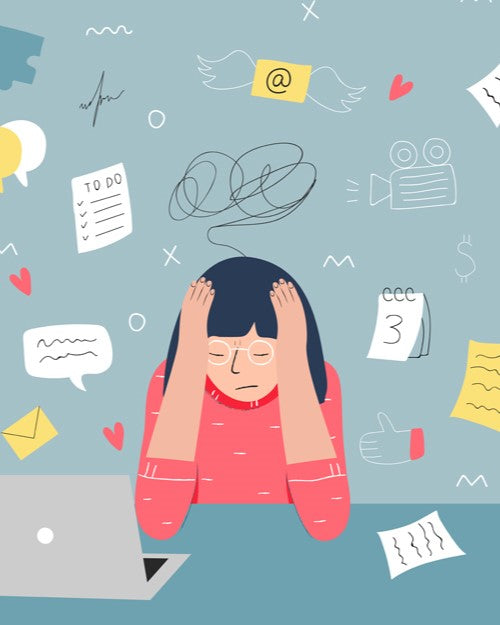Negative Effects of Stress on the Body
-
Cardiovascular Problems: Chronic stress can lead to high blood pressure, increased heart rate, and a higher risk of heart disease. It also contributes to the buildup of plaque in arteries, potentially leading to serious cardiovascular issues.
-
Weakened Immune System: Stress triggers the release of stress hormones like cortisol, which can suppress the immune system's response to infections. This makes you more susceptible to illnesses.
-
Digestive Issues: Stress can disrupt the digestive system, leading to problems such as irritable bowel syndrome, indigestion, and even exacerbating symptoms of chronic conditions like Crohn's disease and ulcerative colitis.
-
Weight Gain and Obesity: High levels of stress are associated with emotional eating and cravings for unhealthy foods. This can lead to weight gain and increase the risk of obesity.
-
Mental Health Concerns: Stress is closely linked to anxiety, depression, and other mental health disorders. It can also exacerbate existing mental health conditions.
3-Step Guide to Manage Stress
Step 1: Recognize Your Stressors
-
Self-Reflection: Think about situations, events, or people that consistently trigger stress in your life. Journaling can be a helpful tool to track stressors.
-
Physical and Emotional Cues: Pay attention to your body and emotions. Physical symptoms like tension, headaches, and fatigue, as well as emotional reactions like anxiety or irritability, can signal stressors.
-
Common Categories: Stressors often fall into specific categories:
- Work-related Stress: Job pressures, long hours, demanding bosses, and job insecurity can all contribute to work-related stress.
- Financial Stress: Worries about money, such as debt, bills, or job loss, can be a significant source of stress.
- Relationship Issues: Conflicts with family members, friends, or romantic partners can be emotionally taxing.
- Major Life Changes: Significant life events, whether positive (like marriage or a new job) or negative (like divorce or death of a loved one), can be stressors.
- Academic Pressure: Students often experience stress due to exams, assignments, and the pressure to excel academically.
- Health Concerns: Medical issues, chronic illnesses, or concerns about one's health or the health of a loved one can cause stress.
- Environmental Stressors: Natural disasters, pollution, noise, and other environmental factors can contribute to stress.
- Social and Cultural Pressures: Expectations from society, cultural norms, and social comparison can lead to stress.
- Parenting Stress: Raising children can be highly rewarding but also stressful due to the demands of caregiving, financial responsibilities, and the desire to be a good parent.
- Time Pressure: Feeling constantly rushed, trying to meet deadlines, and balancing multiple commitments can be sources of stress.
- Technology and Information Overload: Constant connectivity through smartphones and the influx of information can be overwhelming.
- Trauma: Past traumatic experiences, such as abuse, accidents, or military combat, can lead to post-traumatic stress disorder (PTSD).
- Lifestyle Factors: Unhealthy habits, like poor diet, lack of exercise, and excessive alcohol or substance use, can contribute to stress.
- Overcommitment: Taking on too many responsibilities and not setting boundaries can lead to stress.
- Lack of Control: Feeling like you have little control over your circumstances or environment can lead to feelings of helplessness and stress.
Step 2: Prioritize and Assess
-
Identify High-Impact Stressors: Determine which stressors have the most significant impact on your well-being and overall life.
-
Assess Control: Evaluate how much control you have over each stressor. Some stressors can be managed or eliminated, while others may require coping strategies.
Step 3: Develop Stress Management Strategies
-
Eliminate or Reduce Stressors: For stressors you have control over, take proactive steps to eliminate or reduce them. This might involve setting boundaries, making lifestyle changes, or seeking professional help.
-
Coping Strategies: For stressors that cannot be eliminated, develop coping strategies to manage their impact.
- Mindfulness and Relaxation Techniques: Practice deep breathing, meditation, or progressive muscle relaxation to calm your mind and body.
- Time Management: Prioritize tasks, set realistic goals, and use time management techniques to reduce the feeling of being overwhelmed.
- Problem-Solving: Identify potential solutions to the stressor and take action to address the problem.
- Seek Support: Reach out to friends, family, or a therapist for emotional support and guidance.
- Physical Activity: Regular exercise can help reduce the physical effects of stress and improve mood.
- Healthy Lifestyle: Focus on a balanced diet, adequate sleep, and avoiding excessive caffeine or alcohol intake.
- Limit Technology: Reduce screen time, especially before bedtime, to manage information overload and improve sleep quality.




















































































